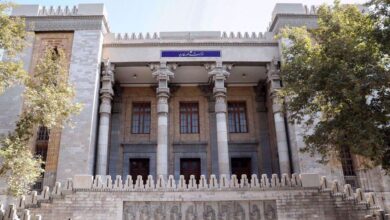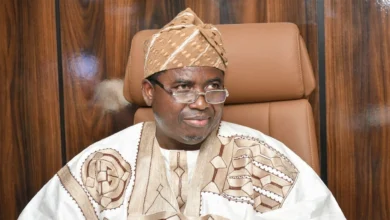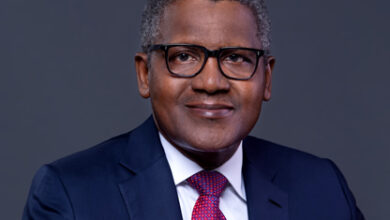Rhodes-Vivour warns stealing Nigerian votes in 2027 will have consequences
*Says he's not calling for coup

By KEMI KASUMU
Speaking to the challenges facing youth in Lagos, he raised alarms over the alleged intentional circulation of drugs in certain communities. Rhodes-Vivour stressed the danger of using vulnerable populations for political maneuvering, urging a collective examination of these practices.
In a recent interview on The TRSH Podcast, Gbadebo Rhodes-Vivour, the Lagos State Labour Party (LP) governorship candidate for the 2023 election, has emphasized the impending political shifts anticipated in the state leading up to the 2027 general elections.
His strong messages targeted current political powers, notably Governor Babajide Sanwo-Olu, addressing issues surrounding electoral integrity and governance.
On consequences for undermining democratic process, Rhodes-Vivour warned those in power, highlighting the necessity of accountability in the democratic process, even as he stated unequivocally that, “You won’t steal votes and carry on with your lives,” indicating that the electorate would no longer overlook corruption or manipulation in elections.
Responding to governance failures, he criticised the current government’s approach to public dissatisfaction, pointing out the persistent foul smell in various parts of Lagos State.
He urged Governor Sanwo-Olu to focus on solutions rather than defensiveness and anger and called for leadership that engages constructively with citizens rather than deflecting responsibility.
“Why do you have to be angry and insult people when they tell you Lagos smells instead of offering solutions?” he asked, adding that, “They always turn the problem back on the people. If you want to turn the problem back then don’t be a leader — sit with the people.”
Rhodes-Vivour voiced growing concerns regarding environmental hygiene, citing blocked drainage systems and the resulting stench, particularly during the rainy season.
He labeled the leadership structure in Lagos State as prioritizing the interests of a select few, aligning with what he described as an “organised mafia” system.
Challenging stereotypes surrounding grassroots engagement, the Obalefun of Lagos emphasized that strategic political involvement encompasses a broader demographic, including educated and affluent communities, while positing that accessible governance should engage all citizens near polling units.
“The APC structure exists for one thing and one thing alone — to create and normalize a system that milks the commonwealth of Lagos State solely for President Bola Ahmed Tinubu, his family and his cronies,” he alleged, adding that, “The only thing similar is the organised mafia.”
He also challenged the popular notion of “grassroots politics,” emphasizing that true grassroots engagement goes beyond socioeconomic assumptions.
“When people think grassroots, there’s a misconception that it’s the illiterate, uneducated and poor, which is a mistake. There’s grassroots in V.I., Ikoyi, think of grassroots as the people closest to that polling unit.”
Speaking to the challenges facing youth in Lagos, he raised alarms over the alleged intentional circulation of drugs in certain communities. Rhodes-Vivour stressed the danger of using vulnerable populations for political maneuvering, urging a collective examination of these practices.
“There’s a deliberate attempt to get our youths on drugs so they can be useful tools for the political elites, and that needs to be questioned and challenged,” he stated.
According to him, “Places like Seriki Aro, Ikeja under bridge — people send drugs into these communities. It’s like impoverishing your populace.”
He said anybody that would win the 2027 presidential election must be prepared to sanitise the country just like the late Dora Akunyili, former Director-General, National Agency for Food and Drug Administration and Control (NAFDAC).
According to him, “I am not calling for a coup in Nigeria. I am saying that the personality that we are going to meet in a party as a president is somebody that is a no-nonsense; upright, righteous, constantly seeking the best and maximising the opportunity for Nigerians because there is a lot of nonsense around this place that you need to have a strong hand, if not, you will be there for four years and nothing would have been done.
“To achieve that, you must be righteous. You cannot be stealing with one hand and pointing another hand at someone who is stealing. It cannot work, but when you come in and you are not stealing, nobody around you can steal. Based on that righteousness, you will command respect.
“They may attempt to assassinate you like they did for Dora Akunyili in NAFDAC, because many people are making money by selling fake drugs.
“Assuming she went there to mingle with bad eggs or encourage fake drugs, nobody would try the assassination attempts.
“We are talking about a strong leader that will also value democracy but he is able to hold onto the helm of affairs strongly.”
In response to claims about his lack of experience, he questioned the merit of experience in corrupt systems and expressed a desire to emulate leaders characterized by integrity and ethical governance, citing the respected legacy of late Alhaji Lateef Jakande.
“I remember when people said Gbadebo Rhodes-Vivour does not have experience, and I asked — which government? The government of illegality, looting and stealing? I would want to have experience in a government like that of late Alhaji Lateef Jakande,” he said.
Rhodes-Vivour praised former presidential candidate Peter Obi for his principled stance against excessive campaign spending and emphasized the importance of authentic connections with the electorate over traditional campaigning methods.
“Anywhere I go, I take pictures with people that want to identify with me — those are my banners and posters,” he quoted Obi as saying.
As political tensions rise in anticipation of the 2027 elections, Rhodes-Vivour’s comments reflect a growing public desire for accountability and improved public services.
He articulated a vision for a reformed Lagos State where the voices of its citizens are respected, and corrupt practices face tangible consequences.
He said, “The Gbadebo of 2025 is not the same as 2022/2023 and I believe I can speak for His Excellency Peter Obi too, there will be consequences for stealing votes in the next Nigerian election, you won’t steal votes and carry on with your lives.”
In his concluding remarks, Rhodes-Vivour encapsulated the current sentiments of many citizens, affirming that electoral fraud would not be tolerated, setting the stage for a more robust political engagement in the years to come.




